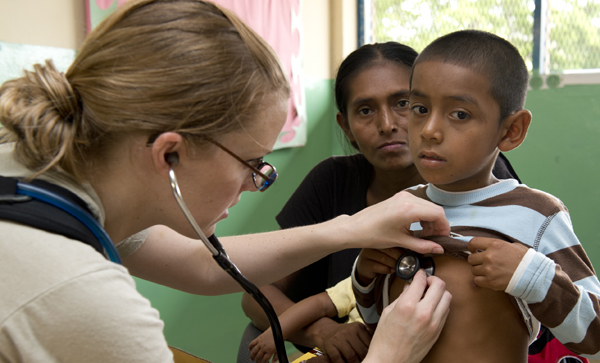When You Don’t Speak The Same Language As Your Child’s Doctor

When You Don’t Speak The Same Language As Your Child’s Doctor
When Margarita Ruiz takes her children to the doctor’s office, she has no choice but to trust that nurses and front desk staff are translating medical orders accurately. She doesn’t speak English and her children’s pediatrician speaks very little Spanish.
Ruiz said she feels grateful that staff members at the office of her children’s current doctor are usually available to translate. In the past, in a different doctor’s office, her oldest son, 14, translated for her. “It wasn’t ideal, but I didn’t have much of a choice,” said the 33-year-old homemaker.
Health care experts say it is not advisable to use untrained interpreters, whether they are medical office staff members or your own family members.
Ruiz said the language barrier has not discouraged her from taking her four sons, aged 2 to 14, to medical appointments, but she wishes she could communicate more effectively with their doctor.
Latino parents who speak only Spanish are less likely to report having a satisfactory experience with their children’s doctors than Latino parents who speak only English, or at least some English, a new analysis of California data shows.
Professor Alex Ortega said it is important to evaluate the communication barrier between doctors and parents because of the impact it could have on children’s health.
“If parents don’t understand their providers, they are less likely to properly manage problems at home,” Ortega said. “This is particularly problematic for kids with chronic [diseases] such as obesity, asthma and childhood diabetes, which are big issues in Latino communities.”
The experience of Latino families in medical settings has been the subject of many studies, but the analysis published in Academic Pediatrics shows serious disparities in health care communication within the same ethnic community, Ortega noted.
Yet the study does not show delays in care for families facing language barriers. “Access was about the same for all Latino children,” Ortega said. “That’s the good news.”
Dr. Alicia Fernandez, a professor of medicine at UCSF and a physician at San Francisco General Hospital, explained that using untrained interpreters — such as family members or office staff — can lead to clinically significant errors.
For example, medical vocabulary may not be easily understood by a lay person, especially a child, she said.
Asking a child to translate also distorts the family dynamic, Fernandez added. “When parents don’t speak English and the child does, the child prematurely takes on an adult role in the family.”
Even with a qualified interpreter on hand, communication can be a challenge. That’s because physicians are not necessarily trained to work through interpreters, Fernandez said. When using an interpreter, doctors often dominate the conversation, making it harder for the patient to raise questions and concerns, she said.
Fernandez said many of her patients want to learn English but were poorly educated in their country of origin, which might make it more difficult for them to learn a second language. They may also face obstacles such as long work hours and not being able to afford classes.
“In the meantime, they or their kids get sick and the health care system has to deal with it,” Fernandez said.














